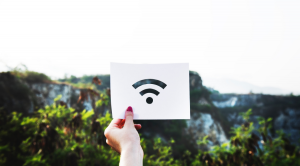Is it safe to use Wi-Fi on my computer?
In-flight Wi-Fi poses many of the same security risks as other public Wi-Fi networks. Just like when using Wi-Fi at cafes, airports or hotels, passengers connecting to in-flight Wi-Fi need to be cautious and take protective measures to avoid cyberattacks.
In a recent case, in June 2024, an Australian man was charged with carrying out “evil twin” attacks on a flight and at airports. He allegedly created fake Wi-Fi networks to trick users into visiting fake login pages, asking them to provide their email and social media credentials. This method allowed him to collect a lot of sensitive information from his victims.
As more and more flights offer Wi-Fi – whether for a fee or for free – the flying experience could become more enjoyable. However, to ensure their own safety, passengers need to be aware of security risks and take necessary precautions.
How safe is in-flight Wi-Fi?
Like public Wi-Fi networks on the ground, in-flight Wi-Fi may not be completely secure. While many airlines have adopted WPA2 encryption to protect in-flight Wi-Fi, its effectiveness can vary depending on how each airline implements it. Stronger security standards like WPA3 encryption have not yet been widely adopted on in-flight Wi-Fi systems.
In addition, the Wi-Fi provider, the airline, has the ability to log your online activity if the connection is not encrypted. While they cannot see the details of what you are typing, they can still monitor the websites you visit.
In-flight Wi-Fi Attack Risks
Evil Twin Attack: This type of attack creates a fake Wi-Fi hotspot, with a name similar to the legitimate network, to trick users into connecting. When connecting, users may be asked to enter personal information, which the hacker will attempt to collect.
Man-in-the-Middle (MITM) attacks: On planes, hackers can use shared networks to perform man-in-the-middle attacks, intercepting or interfering with data between users and servers, taking advantage of the high density of passengers' connections.
How to protect yourself when using Wi-Fi on planes
Some experts recommend limiting the use of Wi-Fi on planes, but this may not be practical. To use public Wi-Fi safely, take the following measures:
Verify the Wi-Fi network: Make sure you are connected to an official network. If asked to enter a password or sensitive information, disconnect immediately.
Use a VPN: RICE VPN encrypts your traffic, protects your data from man-in-the-middle attacks and packet sniffing, keeping your online activities safe and private in the air as well as on the ground.
Why In-Flight Wi-Fi Can Be Unreliable
While in-flight Wi-Fi is convenient, the connection quality can be inconsistent, which can be frustrating for passengers. To provide Wi-Fi at altitudes of around 35,000 feet, planes must maintain a connection to satellites or cell towers on the ground, even while traveling at speeds of up to 550 miles per hour.
Wi-Fi connections can be disrupted by a number of factors, such as when the plane flies over the Arctic, switching between satellite or cell tower signal beams, bad weather, or when the plane has not reached the minimum altitude (10,000 feet) required to enable Wi-Fi.










